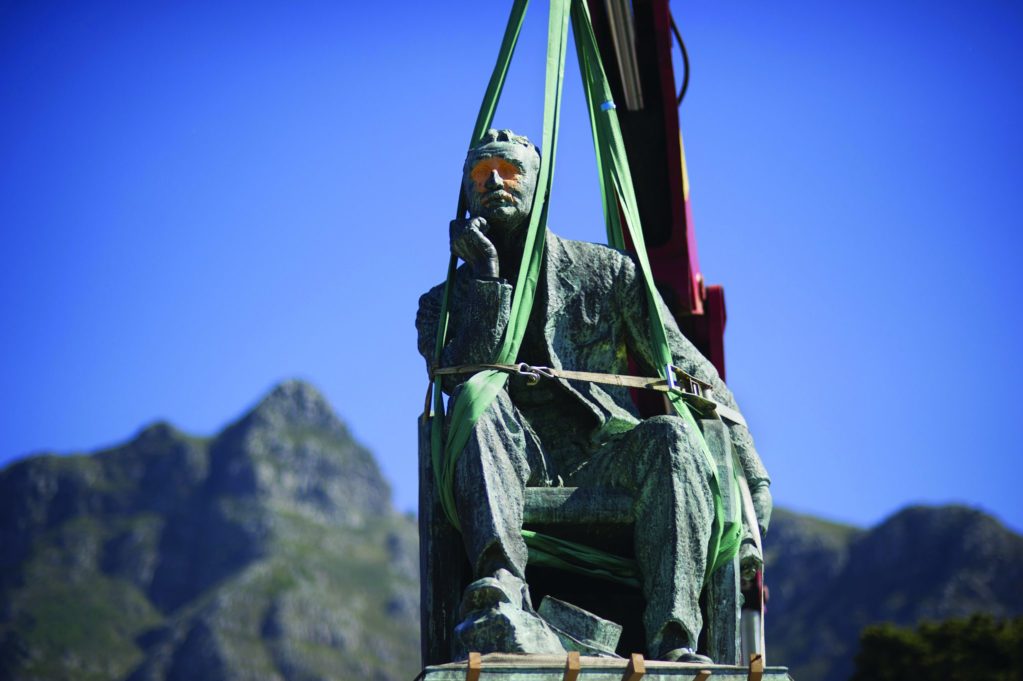All of this shouting for the removal of the statue and bones of Cecil John Rhodes – the arch African colonist from England who thought, seriously, that America was a colony that should be returned to the empire – has been done before.
More than 16 years ago, I stood spellbound at Malindidzimu, the windswept outcrop of rock a short drive from Bulawayo in Zimbabwe where chiefs of the Mandebele have been laid to rest for centuries. It was a tranquil place that Rhodes used to go to stand and stare at the breathtaking view of the sweeping land of hills and valleys that disappear over the horizon. Rhodes used to call it the world’s end and chose to be buried there.
I was there, as a television journalist, to get the other side of the story that had been raging among the young radicals in Harare for weeks. A bunch of young Turks wanted to exhume and expel the remains of Rhodes to wipe the stain of colonialism from Zimbabwe forever.
I had interviewed their leader, the late Warlord Chakaredza, a polite man in his mid-twenties, in Harare a few days before. He was quite clear the bones of Rhodes needed to be exhumed and thrown into the sea.
“Why the sea?” I asked incredulously.
Chakaredza looked at me as if I was mad.
“That is the way he came to Africa and that is the way he will float back to England where he came from,” he replied.
As crude as it sounds, maybe there was a brutal and sublime logic.
I countered to Chakaredza about the beliefs in Africa about the sanctity of graves and the dead. He didn’t want to hear it. The bones of Rhodes must go and they were prepared to use their bare hands to get him out, if need be.
A story to be taken seriously, I thought. Maybe it was a way of pushing forward the debate over colonialism? Maybe Poland wouldn’t have been too keen to look after any graves, or statues, of German generals in Warsaw after World War Two?
We spoke to a historian who told us that the Mandebele loved Rhodes and lined up to salute him at his funeral by shouting: “Bayete!” – the salute reserved for chiefs. What the historian didn’t tell me, that I read only later, was that the black mourners were kept far from the graveside in a segregated funeral.
I also noticed that the Zimbabwe government, which wasn’t exactly head-over-heels when it came to colonialism, didn’t give much of a damn. They saw it as part of Zimbabwe’s heritage and a tourist attraction that brought in money. We also found out, when the statues of the past were ripped down in Harare, after independence in 1980, they weren’t crushed into rubble, they were put into an odd looking group, behind a fence, at the back of the National Museum in Harare.
Another discovery on the rock outside Bulawayo was that Rhodes was buried about 40 feet down in a shaft carved out of sheer rock. Furthermore, the coffin was encased in lead; it would take dynamite, rather than bare hands, to get the remains of the old man out. Maybe he feared someone may try to exhume him.
Nothing happened. The story faded into the ether – Rhodes slept on. No one gained anything from the story, except the newspapers and TV bulletins who garnered a few catchy headlines. I wondered at the time what the point was.
So it was with a roll of the eyes that I heard that students wanted to remove the Rhodes statue in Cape Town. You can call it a metaphor in righting the wrongs of a colonial past; you can call it tantamount to removing a statue of a German general from Poland.
For the second time in 20 years I wonder whether Rhodes and his statues and bones are worth the time and effort.
If I thought for one minute removing the statue of Rhodes would provide books, bursaries and accommodation for young people who wanted to learn, I would take a sledgehammer and knock the statue down myself and then throw it into the sea.
